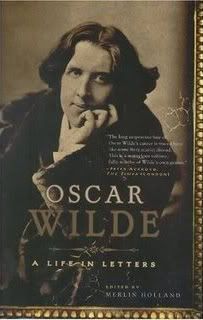 (2006)
(2006)Genre: Non-Fiction/Memoir
Synopsis: Of all 19th-century letter writers, Oscar Wilde is among the greatest. Revealing him at his sparkling, spontaneous, fluent best, these letters bear that most familiar of Wildean hallmarks the lightest of touches for the most serious of subjects. He comments openly on his life and his work, from the early years of undergraduate friendship, through his year-long lecture tour in America as a striving young "Professor of Aesthetics," to the short period of fame and success in the early 1890s when he corresponded with many leading political, literary and artistic figures of the time. Disgrace and imprisonment followed, but even in adversity his humor does not desert him.
***
Review: A Life In Letters is a concise, incomplete collection of Oscar Wilde's letters carefully selected as the best collective representation of the man. Compiled by his grandson, Merlin Holland (also responsible for the complete collection of Wilde's letters), the book features as few interruptions and explanations as possible from Holland, in order to allow Wilde's character speak for itself. Cited as the closest thing to a memoir of Wilde in existence, the 400 or so chosen letters illustrate all aspects of his personal, social, financial and professional life, from the young starry eyed student to the disgraced artistic aesthete stripped of wealth and reputation. Among his correspondants are publishers, rivals, writers, associates, family, and the well known names of Ada Leverson, Robert Ross, Frank Harris, and Lord Alfred (Bosie) Douglas. The only thing missing are his letters to Constance Lloyd, his wife, as most of those have apparently not survived.
The variety of correspondants offers, amidst the contrast of public personas he wore, an occasional glimpse at the truth underneath. The authentic intelligence and deep interest in both his areas of study as well as the issues of his time are clear not only in his carefully articulated, professional address, but also in his excited, poetic rambling letters to friends and family. Some of my favourites included: an early letter regarding a trip to Italy which he wrote to his father as a student - it includes his illustrations and discussion of various art and decor he saw; a letter to a publication supporting the arguments by a woman about the ridiculous nature of corsets and restrictive clothing, and some letters to friends regarding a college grade - he made a show in public of not bothering to see what it was but secretly he was dying to find out, which he admitted to friends.
The later years are, of course, less happy, and though I was never a fan of Bosie Douglas and his treatment of Oscar (relying on him for upkeep and never returning the care), it's very difficult not to be taken in by Oscar's powerful emotions. His heart is clearly poured into everything he writes to and about Bosie. He knows himself they are his undoing, but he also points out, particularly after the loss of everything in prison, that the only thing worse than losing everything is being alone. The choice of letters is by no means sympathethic to Oscar however; both his views and those of his oppositional well-wishing friends can be understood . Instead, these letters clearly illustrate the trials, both literal and figurative, of one man who was indeed a genius of wit, aesthethics and mind, but who was also just that - a man, complete with faults like all those who relinquished their ties with him. It is an endearing, enlightening, intimate and unbiased insight into the man behind the mask wrought wholly of his own words. Being accessible at only 370 pages (versus the 1200 odd in the complete letters) this comes highly recommended as a concise portayal for anyone who doesn't just want facts about the man, but who wants the passion, genius, and flaws within him.
Rating:
